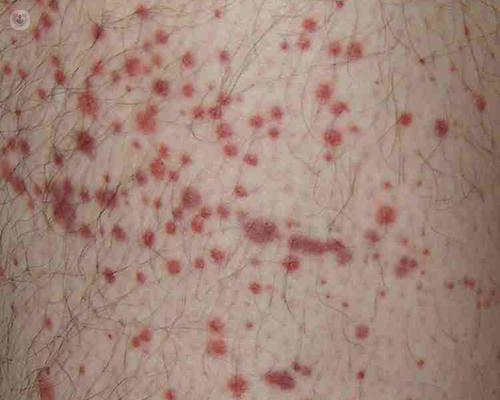



What is purpura?
Purpura, from the Latin word for “purple”, refers to a symptom in which purple or red spots appear on the skin, organs or mucous membranes, including inside the mouth. They are caused when small blood vessels burst and haemorrhage, leading to blood pooling under the skin. These spots are generally benign, but may be caused by a more serious condition, such as a blood clotting disorder.
What are the symptoms of purpura?
Purpura is itself a symptom rather than a condition. It manifests as purple or red spots that do not disappear when pressed against glass. They can vary in size. A doctor will be able to diagnose purpura with a physical examination, and may order further tests to determine the cause of the purpura.
Causes of purpura
Purpura can be caused by a low platelet count in the blood (thrombocytopenia), by other blood clotting disorders, or by other factors.
Thrombocytopenic purpura can be caused by:
- Medications – some medications prevent platelet formation, while others can trigger an immune response that affects platelets.
- Recent blood transfusions
- Infections in the blood
- Immune disorders
- Certain viral infections, e.g. Epstein-Barr, rubella, etc.
- Systemic lupus erythematous
- HIV
- Hepatitis C
Non-thrombocytopenic purpura may be due to:
- Blood clotting disorders
- Weak blood vessels
- Inflammation of the blood vessels, or vasculitis, e.g. Henoch–Schönlein purpura
- Scurvy/Vitamin C deficiency
- Certain congenital conditions, e.g. Ehlers-Danlos syndrome
- Certain medications, e.g. steroids.
- Cocaine abuse
- Radiation poisoning
What is the treatment for purpura?
The treatment depends on the cause of the purpura. Sometimes, both purpura and its underlying cause will resolve on their own, while if it is being caused by medication you are taking, your doctor may stop that medication.
Certain medications may be prescribed, either to help fight the underlying condition or to increase your platelet count. In some extreme cases, a splenectomy (removal of the spleen) may be necessary. This is because the spleen is responsible for eliminating platelets and removing it is a fast way to increase the blood platelet count.